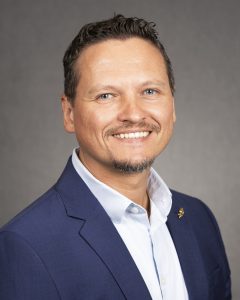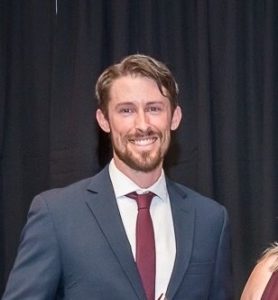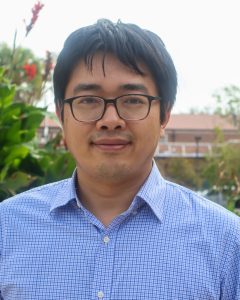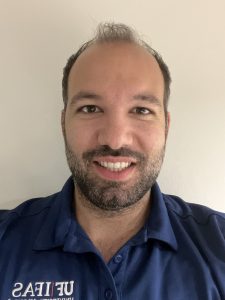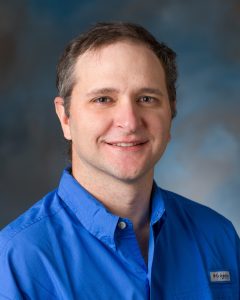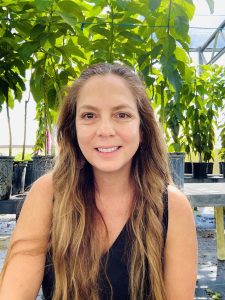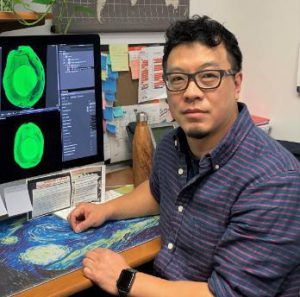The Global Fellows Program is an initiative managed by the University of Florida’s (UF) International Center and partially funded by the Global Food Systems Institute (GFSI) that provides early-career faculty with a $5,000 seed grant, mentorship, and targeted workshops to enhance their international research efforts. This program is aimed at faculty within the first 10 years of their careers and guides the fellows through essential skills for global research while encouraging meaningful collaborations with international partners via an international research experience. Through orientations, specialized workshops, and a closing symposium, participants can build valuable connections with leading researchers and significantly expand their professional networks, setting their research on a global path.
| Name | Department | College | Mentor | Research Country |
| Daniel Czyz* | Microbiology and Cell Science | CALS/IFAS | Eric Nelson | Georgia |
| Adam Dale* | Entomology and Nematology | CALS/IFAS | Jamie Ellis | Cayman Islands |
| Xinde James Ji* | Food and Resource Economics | CALS/IFAS | Conner Mullally | Indonesia |
| Nikolaos Tziolas* | Soil, Water and Ecosystem Sciences | CALS/IFAS | Ramesh Reddy | Australia |
| Travis Thomas** | Nature Coast Biological Station | CALS/IFAS | Laura Reynolds | Guyana |
| Romina Gazis-Seregina | Plant Pathology | CALS/IFAS | Mathews Paret | Taiwan |
| Tie Liu | Horticultural Sciences | CALS/IFAS | Steven Sargent | Brazil |
*Funded by GFSI
**Funded by the Florida Climate Institute
Why is it important to internationalize your research?
International collaborations bring diverse perspectives and innovative ideas to interdisciplinary research. Studies show that internationally collaborative projects are more frequently cited, highlighting their impact and relevance for young faculty members. Global research also opens doors to new funding sources and unique study locations, fueling innovation and discovery. The Global Fellows Program further strengthens UF’s international presence, helping attract global talent and enhance UF’s standing in the global academic community.
This year, the UF International Center’s Global Fellows Program has selected 17 outstanding faculty for the 2024-2025 cohort. Awardees were selected based on professional accomplishments, the originality and significance of their proposed projects, and the potential transformative impact of their work. The review also considered opportunities for collaboration and networking, along with the applicant’s ability to show how the Global Fellows program would enhance their international research skills and collaborations. Of the 17 Global Fellows awardees, seven are faculty members from IFAS, and four have received generous support from GFSI. These fellows will conduct international research with the guidance of seasoned faculty mentors. With a strong presence in the 2025 Global Fellows Program cohort, faculty members affiliated with IFAS and GFSI are well-positioned to tackle critical global challenges. Below are the details of each fellow’s research focus, department, their mentors, and a short statement from each fellow on why is this program important for their career:
Global Fellow: Daniel Czyz
Assistant Professor, UF/IFAS Microbiology and Cell Science Department.
-
- Mentor: Eric Nelson – Associate Professor, Environmental and Global Health Department
- Study Region: Georgia
Dr. Czyz’s research addresses the global crisis of antimicrobial resistance (AMR) through phage therapy, particularly for pathogens like Pseudomonas aeruginosa, Shigella, and Streptococcus. His lab is advancing phage-based treatments for infections across One Health sectors, including animals and humans. He has ongoing efforts to introduce phage applications in aquaculture, veterinary, and human health. Despite these promising developments, phage therapy in the United States is still in its early stages, making international collaboration essential. As a Global Fellow, Dr. Czyz plans to attend the 2025 Summer School Workshop on phage therapy at the Eliava Phage Therapy Center in Georgia, which has a long history in clinical phage application. His participation will enable him to establish new research collaborations, learn proven techniques for translating phage research into therapeutic applications, gain access to established phage libraries, and secure funding for a phage center at the University of Florida. Through the Global Fellows Program, Dr. Czyz aims to contribute to developing effective, affordable treatments for AMR, aligning with multiple UN Sustainable Development Goals and expanding UF’s impact on global health challenges.
Importance of the Global Fellows Program
“The Global Fellows Program provides a critical opportunity to enhance my research by establishing connections with leading phage experts at the Eliava Phage Therapy Center in Georgia. This experience would advance my research and enrich my teaching, allowing me to incorporate new perspectives on AMR therapeutics into the curriculum and possibly develop study-abroad programs for students.”
Global Fellow: Adam Dale
Associate Chair for Extension and Associate Professor, UF/IFAS Entomology and Nematology Department.
- Mentor: Jamie Ellis – Gahan Endowed Professor, UF/IFAS Entomology and Nematology Department
- Study Region: Cayman Islands
Dr. Adam Dale’s research program largely focuses on identifying strategies for creating and maintaining urban landscapes that suppress key insect pests and promote biodiversity and plant health. His Extension program focuses on translating that research to application through educational opportunities and resources for professionals and the public who work with ornamental plants. Scale insects represent the largest proportion of invasive insect plant pest taxa on the globe. These are also among the most difficult insect plant pests to detect and manage, although high-density infestations can have dramatic harmful effects on plant health. Research has demonstrated that these insects are well-equipped to take advantage of human disturbances like urbanization, climate change, and the global plant trade. For example, several scale insect species become more abundant and damaging in response to warmer temperatures and disturbances commonly associated with designed and maintained urban landscapes. Relatively little work has been done to understand the ecology and management of scale insects in tropical regions, including the Caribbean. Recent evidence of global biodiversity loss indicates that it is most severe in the Caribbean region, largely driven by factors linked to human disturbance and invasive species. Given its proximity to Florida and pathways for invasive species movement between the regions, it is important that we increase our understanding of these pests but also communication between professionals involved with plant management and movement.
Importance of the Global Fellows Program
“Participating in the Global Fellows Program will provide a timely opportunity to facilitate international partnerships with Caribbean Ministries of Agriculture and universities that will increase our understanding of invasive insect ecology, distribution, and movement in relation to human activity, along with the capacity to effectively detect and manage these insects.”
Global Fellow: Xinde “James” Ji
Assistant Professor, UF/ IFAS Food and Resource Economics Department
- Mentor: Conner Mullally – Associate Professor, UF/ IFAS Food and Resource Economics Department
- Study Region: Indonesia
Xinde “James” Ji focuses on understanding the impacts of environmental change on local communities. His research seeks to understand the impacts of environmental change on local communities, particularly in shaping livelihoods, health conditions, human capital formation, and cultural norms, as well as how these communities adapt to such changes. To address these questions, his work integrates geospatial data, modern analytics and causal inference methods, and an understanding of local economic institutions and cultural norms. One of his primary international research goals is to launch a new project in Indonesia that investigates the socio-economic and health impacts of mangrove deforestation on coastal communities, with a particular emphasis on vulnerable groups such as children and older adults. Mangrove forests provide coastal communities with numerous ecosystem services, and the degradation of these ecosystems presents significant risks not only to the environment but also to communities whose livelihoods depend on the ecosystem services provided by mangroves. Empowered by remotely sensed geospatial data and longitudinal survey products, the research will be one of the first studies to look at the health and social impacts of mangrove ecosystems, with implications for mangrove conservation in Indonesia and other coastal regions with significant mangrove presence (e.g., Vietnam, Brazil, and the United States). Dr. Ji has already established collaborations with researchers at the Australian National University and Université de Sherbrooke. Initial data collection efforts include securing access to the Indonesian Family Life Survey and mapping spatial-temporal mangrove and forest cover loss patterns.
Importance of the Global Fellows Program
“The Global Fellows Program is a wonderful opportunity to expand and accelerate my existing and ongoing international research portfolio, establish collaborations, and secure funding for international initiatives. The Program’s emphasis on fostering interdisciplinary research and global partnerships aligns with my commitment to comprehensively addressing the complex dynamics of environmental change and its impact on vulnerable populations. The opportunity to join a community of scholars dedicated to global engagement aligns seamlessly with my research agenda and long-term goals of addressing these challenges in international contexts.”
Global Fellow: Nikos Tziolas
UF/IFAS Soil, Water, and Ecosystem Sciences Department
- Mentor: Ramesh Reddy – Graduate Research Professor, School of Natural Resources and Environment
- Study Region: Australia
Dr. Tziolas’s research lies at the intersection of soil science and Artificial Intelligence (AI) and his primary interests focus on improving soil health, which is vital for agricultural productivity, ecosystem resilience, and climate change mitigation. For the Global Fellows program, Dr. Tziolas has the primary goal of working closely with the University of Sydney to develop novel AI-driven algorithms for analyzing multimodal Earth observation data to support digital soil mapping. This research will be among the first to examine how we can leverage large language models and geospatial intelligence to simplify access to soil information for non-experienced users, democratizing scientific outputs. As a Global Fellow, Dr. Tziolas hopes to extend his impact on soil health research and contribute to global efforts in sustainable agriculture and climate resilience.
Importance of the Global Fellows Program
“I believe that the Global Fellows Program will enhance my research and outreach efforts, leveraging best practices from the workshops to attract additional external funding from sources such as USAID or National Science Foundation’s International Research Experiences for Students (IRES) program.”
Global Fellow: Travis Thomas
Research Assistant Professor, UF/IFAS Nature Coast Biological Station
- Mentor: Laura Reynolds – Associate Professor, UF/IFAS Soil, Water and Ecosystem Sciences Department
- Study Region: Guyana
Dr. Thomas’s research uses updated statistical methods and emerging technologies to study the population and movement ecology of imperiled reptile species. As a Global Fellow, Dr. Thomas will study the seasonal movements of the Giant Amazonian River Turtle, a massive freshwater turtle weighing over 100 lbs. This species, which is thought to migrate long distances to reach nesting grounds, could be negatively impacted by altered wet/dry season dynamics in South America. Obtaining baseline data on seasonal migrations and movements is critical for predicting future population levels and setting conservation goals in a changing climate. By focusing on these goals, Dr. Thomas aims to contribute to the conservation of aquatic species and their habitats, ensuring that local researchers are equipped to address the challenges posed by climate change. He’s partnering with local researchers in South America to investigate movement patterns, utilizing satellite-based tags to collect critical data for conservation planning. Dr. Thomas aims to develop a conservation project driven by local participation that benefits turtles and their ecosystems. He also aims to foster lasting partnerships across borders, allowing local researchers to delve into diverse facets of turtle ecology in the face of climate change.
Importance of the Global Fellows Program
“The Global Fellows Program will provide an opportunity to foster new, international collaborations while allowing me to utilize my expertise and unique skillset to assist other researchers. This fellowship opportunity aligns perfectly with my aspirations to conduct meaningful international research.”
Global Fellow: Romina Gazis
Associate Professor, UF/IFAS Plant Pathology Department at the Tropical Research and Education Center – TREC
- Mentor: Mathews Paret – Chair, UF/IFAS Plant Pathology Department
- Study Region: Taiwan
Dr. Gazis’s long-term research goal is to understand the biology behind different plant diseases affecting local industries and natural landscapes. She uses this knowledge to develop efficient and long-term disease management strategies. Dr. Gazis is the primary research plant pathologist for tropical and subtropical fruit and ornamental crops in South Florida and the Director of the Plant Diagnostic Clinic at TREC. Her research and extension work are oriented toward the needs of stakeholders; more specifically, the development of a statewide research and extension program that manages diseases affecting the commercial production of local crops. This program emphasizes education and dissemination of science-based information about tropical crop production, disease and pest management, and best practices for pesticide use. Its development and implementation, guided by the needs of farmers, allied industry representatives, and county extension agents, occurs in the following main areas: (1) improving disease management and therefore increasing the sustainability of tropical and subtropical fruit and ornamental crop production and (2) developing a statewide educational program to improve disease management of tropical and subtropical fruit and ornamental crops.
Importance of the Global Fellows Program
“Participating in the Global Fellow Program will allow the internationalization of my program through a formal and intentional collaboration with institutions in Taiwan such as the Taiwan Agriculture Research Institute, National Chung Hsing University, and the Taiwan Forestry Research Institute. Taiwan producers are recognized worldwide for their ability to implement strategies that allow them to overcome environmental and biotic pressures. Learning about these techniques will benefit South Florida tropical fruit growers and will boost my research and extension program.”
Global Fellow: Tie Liu
Assistant Professor, Horticultural Sciences Department
- Mentor: Steven Sargent – Associate Chair and Professor, Horticultural Sciences Department
- Study Region: Brazil
Dr. Liu’s research focuses on advancing postharvest biology to extend the shelf life of fruits and vegetables. This is crucial in addressing the challenges of food waste, as an increased shelf life not only preserves the nutritional value of produce but also minimizes the environmental impact associated with discarded food. By investigating innovative postharvest genomics and genetics strategies, Dr. Liu aims to enhance the quality and longevity of specialty crops, ultimately contributing to a more sustainable food system. Through collaboration with global partners and integrating science-based methodologies, Dr. Liu seeks to promote sustainable practices that improve food security and ensure responsible resource management worldwide. As a Global Fellow, Dr. Liu aims to establish collaborations in Brazil, particularly with the Federal University of Ceará, to further research on tropical fruits’ postharvest shelf life and nutritional benefits. Participation in the UF Global Fellow Program would enable Dr. Liu to expand international collaborations, develop new research interactions, and contribute to the UF’s mission of global engagement and impact in addressing food security issues.
Importance of the Global Fellows Program
“The opportunity to engage with a diverse community of scholars through the Global Fellows Program will enrich my research and teaching by exposing me to innovative methodologies and best practices from around the world. Collaborating with international experts will enhance my ability to educate students on science-based approaches to improving postharvest life and maintaining quality. Moreover, I am eager to share my experiences in redesigning curricula and introducing new courses at UF, such as “Fighting Food Waste and Loss.” As a Global Fellow, I aim to foster a greater awareness of sustainable practices in postharvest management, contributing to the university’s mission of global engagement and impact in addressing food security issues.”
_______________________________________________________________________________________
If you’re an early-career faculty member interested in expanding your research globally, consider applying to next year’s UF International Center’s Global Fellows Program to join this vibrant community. Research – Office for Global Research Engagement | International Center University of Florida
 5
5
